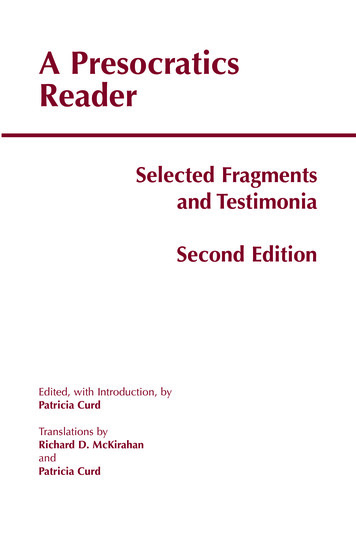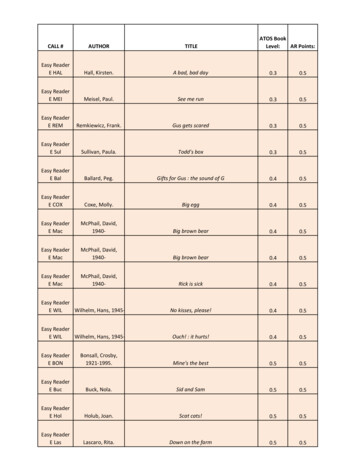
Transcription
A PresocraticsReaderSelected Fragmentsand TestimoniaSecond EditionEdited, with Introduction, byPatricia CurdTranslations byRichard D. McKirahanandPatricia Curd
A PRESOCRATICS READERSecond Edition
A PRESOCRATICS READERSelected Fragments and TestimoniaSecond EditionEdited, with Introduction, byPATRICIA CURDTranslations byRICHARD D. MCKIRAHANandPATRICIA CURDHackett Publishing Company, Inc.Indianapolis/Cambridge
Copyright 2011 by Hackett Publishing Company, Inc.All rights reservedPrinted in the United States of America141312111234567For further information, please addressHackett Publishing Company, Inc.P.O. Box 44937Indianapolis, Indiana 46244-0937www.hackettpublishing.comCover design by Listenberger Design & AssociatesInterior design by Dan KirklinComposition by William HartmanPrinted at Victor Graphics, Inc.Library of Congress Cataloging-in-Publication DataA Presocratics reader : selected fragments and testimonia / edited,with introduction, by Patricia Curd ; translations by Richard D.McKirahan. — 2nd ed.p. cm.Includes bibliographical references.ISBN 978-1-60384-305-8 (pbk.) — ISBN 978-1-60384-306-5 (cloth)1. Philosophy, Ancient—Sources. 2. Pre-Socratic philosophers.I. Curd, Patricia, 1949– II. McKirahan, Richard D.B187.5.P75 2010182—dc222010019297Adobe PDF ebook ISBN: 978-1-60384-598-4
CONTENTSPrefaceOn Abbreviations and NotesMapsTime LineAcknowledgmentsviviiixxiiixiv1. Introduction2. The Milesians2.1. Thales2.2. Anaximander2.3. Anaximenes3. Pythagoras and Early Pythagoreanism4. Xenophanes of Colophon5. Heraclitus of Ephesus6. Parmenides of Elea7. Zeno of Elea8. Empedocles of Acragas9. Anaxagoras of Clazomenae10. Leucippus and Democritus: Fifth-Century Atomism11. Melissus of Samos12. Philolaus of Croton13. Diogenes of Apollonia14. The Sophists14.1. Protagoras14.2. Gorgias14.3. Prodicus14.4. Hippias14.5. Antiphon15. The Derveni Papyrus, Columns 5148153154155162Concordance173v
PREFACEA Presocratics Reader began as a revised and expanded version of thefirst section of Readings in Ancient Greek Philosophy (Hackett, 1st edition1995). For a number of reasons, this is an excellent time to prepare a newedition of the Reader, and most of the changes will be incorporated intothe next edition of Readings in Ancient Greek Philosophy.Since 1995 and 1996 when this volume was put together, Presocraticstudies have grown rapidly. Exciting new material has been discovered: the Strasbourg Papyrus with its previously unknown lines ofEmpedocles, and the Derveni Papyrus, which shows how Presocraticphilosophy was adopted into the wider intellectual world of ancientGreece. There have been new studies published, and numerous international conferences: scholars have asked novel questions, and offeredfresh interpretations. In this new edition, I have revised all of the introductory material (in many cases to take advantage of recent interpretations), and have included much of the new material (especially onEmpedocles) that has come to light. The fragments in the Heraclitusand Empedocles chapters have been reordered, and the chapter on theSophists has been changed in order to provide longer selections anda view of the Sophists more in keeping with contemporary scholarship. Finally, this edition includes the text of the intriguing DerveniPapyrus.For A Presocratics Reader, the most important development has beenRichard D. McKirahan’s complete revision of his excellent volume,Philosophy Before Socrates, for its second edition. The translations fromthis new edition of Philosophy Before Socrates form the backbone ofA Presocratics Reader, and in revising this little book, I have had theadvantage of working through the new material and correspondingwith Professor McKirahan. Suggestions from those who have used APresocratics Reader (including students and colleagues here at PurdueUniversity) have been very helpful, and I have tried to incorporate asmany of them as possible.vi
PREFACEviiThis collection is meant as a sourcebook of moderate length; it is nota complete collection of the fragments and testimonia for the figuresincluded here. My aim has been to provide a good selection from theearly Greek philosophers, along with some of the ancient reports aboutthem, with minimal editorial intrusion. I have strong views about manyissues in Presocratic philosophy, but I have refrained from imposingthem on the reader. Those who want more scholarly intervention shouldconsult the suggested readings at the end of each section. These readings (some introductory and some more advanced) will offer interpretations, arguments, and further references so that anyone beginning herecan quickly enter the world of Presocratic scholarship.In the last two years I have worked with Richard McKirahan ashe was preparing the second edition of Philosophy Before Socrates. Heallowed me to use a version of the new text in a seminar with upper-levelundergraduates and graduate students at Purdue University, and wediscussed many questions of translation and interpretation. As always,I have learned much from Richard, even—and perhaps mostly—whenwe disagree. (I am happy to note that over these years we have come tohave more agreements.) I am grateful for his comments and suggestionson my work over the years, including this project. I have also benefitedfrom the Pythagorean expertise of Professor Carl Huffman, to whom Iextend thanks.The editors at Hackett Publishing have supported Readings in AncientGreek Philosophy and A Presocratics Reader from the beginning, and I amgrateful to them, and especially to Brian Rak and Liz Wilson.
ON ABBREVIATIONSAND NOTESThe standard text collection for the Presocratics is H. Diels andW. Kranz, Die Fragmente der Vorsokratiker (6th edition, Berlin, 1951, andlater printings), commonly referred to as DK. This collection has definedthe scholarly conventions for referring to Presocratic texts, whether inGreek, Latin, or a modern translation. For each Presocratic philosopherDK assigns an identifying number: for example, Heraclitus is 22 andAnaxagoras is 59. DK uses the letter A to indicate testimony from ancientsources about that person, and the letter B to refer to what are taken tobe direct quotations from that figure’s work. These quotations are alsoreferred to as the fragments, since all we have are small sections fromlonger works. Furthermore, DK identifies the testimonia and fragmentsby unique numbers. Thus text identified as 22A2 refers to Heraclitus(22) testimony (A) number two (2); and text identified as 59B12 refers toAnaxagoras (59) fragment (B) number twelve (12).In this volume, DK numbers (where available) accompany everyquotation; when all the passages in a chapter come from the same section of DK, the particular Presocratic’s identifying number (22 or 59in the examples just given) is listed only for the first passage. Hencefragment 1 from Anaxagoras will be identified as “(59B1)” and fragment 12 as “(B12).” Where texts come from more than one section, complete identifying DK numbers will be used as appropriate. In all cases,the source of the testimony or fragment from which DK drew the textappears at the end of the passage. For those texts that are not includedin DK, the standard textual identification for the source is given alongwith the indication “not in DK.” Where proper names follow textualreferences, the reference is to the editor of the standard edition of therelevant text. For example, in the Heraclitus chapter, the entry “Proclus,Commentary on Plato’s Alcibiades I 117, Westerink” following selection 8(B104) indicates that the fragment comes from Proclus’ Commentary onPlato’s Alcibiades I, and can be found on p. 117 of L. G. Westerink’s 1954viii
ON ABBREVIATIONS AND NOTESixedition of the text. References to two major papyrus collections use thestandard abbreviations “P.Herc.” and “P.Oxy.”1Unless otherwise indicated, translations are by Richard D. McKirahan.In the few places where I have modified his translations, “tmpc” appearsin the source identification line; where I have translated the entire passage, “tpc” appears. All of the translations in Chapter 9 (Anaxagoras)are mine.Notes on the texts are scattered throughout this collection. Notes fromthe translator (McKirahan) are marked as such; all other notes aremine.Finally, in the translations of quoted passages from ancient authors,I use a system of brackets:(. . .) Parenthetical comment in the ancient text . . . Supplements to the text (either proposed by scholars, oradded by the translator for the sake of clarity)[. . .] Alternative possible translations, explanatory remarks, orcontext for the quoted passage1. P.Herc. is the Herculaneum Papyri, followed by the classification number ofthe papyrus. (More information can be found at http://163.1.169.40/cgi-bin/library?site localhost&a p&p about&c PHerc&ct 0&1 en&w utf-8.)P.Oxy. is the Oxyrhynchus Papyri, followed by the classification number of thepapyrus. (More information can be found at http://www.papyrology.ox.ac.uk/POxy/.)
xMAPSMAPSA PRESOCRATICS READER
MAPSxi
Greece andWestern Asia Minor00LESBOS100 Kilometers100 us ander OEOTIAMt.CHIOSThebesHelicon MarathonMegaraRhamnousElisAthensCorinthPEL MycenaeOlympia OPO DIAxiiA Presocratics Reader
TIMELINETIME LINExiiiTIME LINE
ACKNOWLEDGMENTSExcerpts from Richard D. McKirahan, Philosophy Before Socrates: AnIntroduction with Texts and Commentary, 2nd edition, Hackett PublishingCompany, 2010. Copyright 2010, Hackett Publishing Co. Reprinted bypermission of the Publisher.Excerpts from Patricia Curd, Anaxagoras of Clazomenae: Fragmentsand Testimonia. Texts and Translation with Notes and Essays (The PhoenixPresocratics Series), University of Toronto Press, 2007. Copyright 2007,University of Toronto Press. Reprinted by permission of the Publisher.xiv
1. INTRODUCTIONAncient tradition says that Thales of Miletus predicted an eclipse of thesun. Although we know none of the details of this supposed prediction,the event (an eclipse in 585 BCE) has traditionally marked the beginningof philosophy and science in Western thought. Aristotle, who was one ofthe earliest to think critically about the history of philosophy, speculatedabout why this kind of inquiry should have begun in Miletus, a Greekcity on the Ionian coast of Asia minor (in what is now Turkey); like laterscholars who have asked this question, Aristotle was unable to find ananswer. So the circumstances surrounding the beginning of philosophyremain unclear; perhaps the question is unanswerable. Nevertheless,Thales, the titular first philosopher, stands at the beginning of a greattradition of rational inquiry and critical thought about the world and theplace of human beings in it that continues to the present day.Thales was the first of a succession of thinkers known as thePresocratics who lived in Greece in the sixth and fifth centuries BCE.1These thinkers do not belong to any unified school of thought, and theydiffered dramatically in their views. Yet they share intellectual attitudesand assumptions and they all display an enthusiasm for inquiry thatjustifies studying them as a group. It cannot be merely Thales’ reportedprediction of an eclipse that can justify our thinking of him as the firstWestern philosopher and scientist—after all, both the Babylonians andthe Egyptians had complex astronomies. Nevertheless, for Aristotleand those who came after him, Thales, and his fellow-Milesians1. The name “Presocratics” comes from 19th-century classical scholars, whosaw a fundamental break between the interests and methods of our group ofthinkers and Socrates (470–399 BCE), and who regarded Socrates’ interests inethics as a radical advance in Western thought. Few would now agree with thatevaluation, and it is worth pointing out that several of our Presocratics wereactually contemporaries of or younger than Socrates. So, as a descriptive label,the name “Presocratics” is misleading, but as a designator for a recognizedgroup of thinkers, it is quite useful, and I shall use it here in that sense. For moreon this issue, see articles in Long and in Laks and Louguet.1
2A PRESOCRATICS READERAnaximander and Anaximenes, shared an outlook that truly marks thebeginning of philosophical inquiry. Part of this was a willingness tospeculate and give reasons based on evidence and argument. Anotheraspect was a commitment to the view that the natural world (the entireuniverse) can be explained without needing to refer to anything beyondnature itself. For instance, Thales seems to have thought that everythingis from water (although it is not clear whether he thought that water isthe origin of all things, or that everything really is water in some formor another). This may strike us as a naïve and overly simplistic claim.Yet Aristotle saw in Thales’ views something that suggested that Thaleshad reasons and arguments for them:[T]hey do not all agree about how many or what kinds of such principles there are, but Thales, the founder of this kind of philosophy,stated it to be water. (This is why he declared that the earth rests onwater.) Perhaps he got this idea from seeing that the nourishmentof all things is moist, and that even the hot itself comes to be fromthe moist and lives on it (the principle of all things is that fromwhich they come to be)—getting this idea from this considerationand also because the seeds of all things have a moist nature; andwater is the principle of the nature of moist things.(Aristotle, Metaphysics 1.3 983b18–27 DK 11A12)From Aristotle’s comments, it is clear that he thought that Thales’ claimwas based on reasoning from observational evidence.We may contrast Thales’ account of the character of the natural worldwith the story Hesiod tells (probably in the century before Thales) aboutthe origin of the cosmos:Tell me these things, Muses, who dwell on Olympus,From the beginning, and tell me, which of them was born first.First of all Chaos came into being. Next camebroad-breasted Gaia [Earth], the secure dwelling place forever of allthe immortals who hold the peak of snowy Olympus.And murky Tartaros [Underworld] in a recess of the broad-roadedEarth,and Eros [Love], who is the most beautiful among the immortalgods, wholoosens the limbs and overpowers the intentions and sensible plansof all the gods and all humans too.
1. INTRODUCTION3From Chaos there came into being Erebos [Darkness] and blackNight.From Night, Aithēr [bright upper air] and Hemera [Day] came intobeing,which she conceived and bore after uniting in love with Erebos.Gaia first brought forth starry Ouranos [Heaven]equal to herself, to cover her all aboutin order to be a secure dwelling place forever for the blessed gods.She brought forth long mountains, beautiful shelters of divineNymphs who live in wooded mountains,and also, without delightful love, gave birth to the barren sea,Pontos, raging with its swelling waves. Then,bedded by Ouranos, she gave birth to deep-swirling Oceanand Koios and Kreios and Hyperion and Iapetosand Theia and Rhea and Themis and Mnemosyneand Phoebe with a golden wreath and lovely Tethys.After them, last of all, was born crafty-minded Kronos,the most terrible of the children, and he hated his mighty father.(Hesiod, Theogony 114–38)Hesiod requests the help of the Muses for the claims he will make. Hethen reports on the births of the gods with the Muses’ authority as hissource. In relying on the Muses, Hesiod does not infer his account ofthe cosmos from natural evidence. Nor does he think that appeals toevidence are necessary: the divine warrant offered by the Muses is sufficient for his purposes. Hesiod’s account of the origins of the universe(his cosmogony) is in fact a story of the origins of the gods (a theogony).Each aspect of the cosmos is identified with the distinct characteristicsand personality of a god, who controls that part of the universe. Thechange from the state of chaos to the presence of Gaia (Earth), Tartaros(the deepest underworld), Eros (desire), Erebos (the darkness under theearth), and Night is not explained in this passage.2 Earth, Tartaros, andEros simply came to be; there is no attempt to explain how this happened or justify why they came to be at exactly this moment ratherthan another. Once Eros is present, the model of generation is primarily sexual, although we are told that Gaia (Earth) gave birth to Pontos(sea) “without delightful love.” These gods who, in some sense, are the2. Hesiod says that Chaos “came into being”; there is no explanation for thiscoming-to-be.
4A PRESOCRATICS READERdifferent parts of the universe, behave like humans in their desires,emotions, and purposes. As in the Egyptian, Sumerian, and Hebrewcreation myths, the Hesiodic story makes no clear distinction betweena personality and a part of the cosmos: The natural and the supernatural coincide. Since Hesiod feels no compunction about assertinghis claims without reasons to support them, he seems to think thatthe proper response to the story is acceptance. The hearer or readershould not subject it to critical scrutiny followed by rational agreementor disagreement.While the Presocratics rejected both the kind of account that Hesiodgave and his attitude toward uncritical belief, we must take care not tooverstate the case: In the fragments of the Presocratics we shall find gapsin explanation, appeals to the Muses, apparent invocation of divine warrant, breaks in the connection between evidence and assertion. Despiteall these apparent shortcomings, these early Greek thinkers took a boldleap in adopting a critical attitude. In the case of the Milesians, forinstance, we find each proposing something different as the ultimatefoundational reality of the cosmos. Anaximander, who followed Thales,apparently rejected the idea that water is the basic stuff; in its place heposited a single reality that he called the boundless (or the indefinite),something with no specific characteristics, out of which arise the otheringredients of the cosmos. Anaximander’s follower Anaximenes, in turnrejects the boundless, apparently arguing that it was just too indefiniteto do the job Anaximander required of it. Anaximenes claimed that airwas the foundational stuff. Moreover, he seems to have seen that therewas a gap in the earlier Milesian theories: Thales and Anaximanderprovided no mechanism to account for the transformations of their basicstuff. Anaximenes remedies this by proposing the processes of condensation and rarefaction: as air becomes more rarified or compacted, otherstuffs are produced. Despite the disagreements among them, even thisbrief view shows that the Milesians worked within a shared frameworkof argument and justification.Having adopted this critical attitude, the early Greek thinkers facedthe question of what a human could justifiably claim to know. TheMilesians might make claims about the basic stuff of the cosmos, andmight give arguments for these claims, but how could they claim to haveknowledge about an original or basic state of the universe, which theyhad never experienced? Hesiod would have an answer to this question:He could say that his information came from the Muses, and he couldcall on them to authenticate the truth of his claims about the coming-
1. INTRODUCTION5to-be of the gods. In the same way, we find Homer calling on the Museswhen he wants to offer a catalogue of the leaders of the expedition toTroy. Because the Muses are divine they are immortal; since they werepresent for the gathering of the ships, they are appropriate as witnessesand can provide assurance that the story Homer tells is true:Tell me now Muses, who have dwellings in Olympusfor you are goddesses and present and know everything,while we hear only rumor and we know nothing;Who were the Greek commanders and leaders?The throngs I could never tell nor name,Not even if ten tongues, ten mouths belonged to me,a voice unbroken, and a bronze heart within me,Unless the Olympian Muses, daughters of aegis-holdingZeus, put into my mind those who came below Ilion.(Homer, Iliad 2.484–92; tpc)Although the contexts differ, Homer and Hesiod use the same invocation of the Muses to guarantee their claims: historical for Homer,religious and cosmogonical for Hesiod. Xenophanes of Colophon specifically rejects this justification. “By no means,” he says (21B18), “did thegods intimate all things to mortals from the beginning, but in time, byinquiring, they discover better” (tpc). In rejecting divine authority fortheir claims, the Presocratics invite inquiry into the sources of humanknowledge. A tantalizing mention of this problem appears in a fragmentfrom Alcmaeon, who echoes Homer’s claims that the gods know allthings, but apparently offers a more pessimistic outlook for humans:“Concerning the unseen, the gods have clarity, but it is for men to conjecture from signs . . .” (DK24B1; tpc). We do not have the end of the fragment, but it is clear that Alcmaeon is contrasting the limited epistemicstatus of humans with the exalted certainty that the gods enjoy.We find the Presocratics considering what separates sure and certainknowledge from opinion or belief, and the roles of sense perception andthought in acquiring knowledge, and, indeed, worrying about the verypossibility of such knowledge. Moreover, as competing theories aboutthe cosmos appear, the problem of theory justification comes to the fore.Sometimes, as with the three Milesians, justification might be a questionof which theory appears to fit the evidence best; but there is anotheraspect to theory justification, and that is the metatheoretical questionabout what constitutes a genuine theory, regardless of the particular
6A PRESOCRATICS READERcontent. This problem is raised most strikingly by Parmenides of Elea,and his powerful arguments about what can be genuinely thought andsaid haunt the Greek thinkers who come after him, including Plato andAristotle.Although we call these early Greek thinkers “philosophers,” theywould probably not have called themselves by that name.3 They wereactive in many fields, and would not have thought that astronomy, physics, practical engineering, mathematics, and what we call philosophywere separate disciplines, and most would not have thought that engaging in study of any of these areas would preclude them from beingactive in politics. In a society that was still more oral than literary, inwhich books (as scrolls, not codices) were just beginning to be writtenand distributed, the Presocratics thought and wrote about an astounding number of things. In the ancient testimonies about the Presocratics,we find reports of writings on physics, ethics, astronomy, epistemology, the gods and human worship of them, mathematics, metaphysics,meteorology, geometry, politics, the mechanism of sense perception,history (including the history of their own field), and even paintingand travel. They wrote in poetry and they wrote in prose. They wereas interested in the question of how a human being ought to live asin the question of the basic stuffs of the cosmos. Struggling to makephilosophical notions clear in a language that did not yet have technicalphilosophical terms, they used elegant images and awkward analogies,straightforward arguments and intricate paradoxes. Much of their workhas not survived, and we know of most of it only through the reportsand quotations given by later philosophers and historians.4 These laterscholars preserved or referred to those parts of Presocratic thought thatwere most relevant for their own work; therefore most of what has comedown to us are fragments of and testimonia about their views on naturalphilosophy, metaphysics, epistemology, and ethics, and so the bulk ofmaterial included in this volume is on those topics.3. The first use of the term may be in Heraclitus; it is Plato who tries to restrictthe name to a certain group of thinkers.4. In the 1990s, fragments of a papyrus scroll in Strasbourg were pieced togetherand discovered to contain text from Empedocles of Acragas. The StrasbourgPapyrus has both known and previously unknown lines, and may well be theonly direct transmission of a Presocratic text that we know (although scholarsdisagree about this). Translations of the new material are included in Chapter8, Empedocles of Acragas.
1. INTRODUCTION7In the latter part of the fifth century BCE, there was great interest insocial, political, and moral questions, and a number of thinkers exploredthese topics almost exclusively. They were called Sophists, and theywere independent and often itinerant teachers of wisdom and practicalpolitical skills. Many of them were accomplished and flamboyant rhetoricians. They investigated questions about the nature of moral virtue andthe best way for a city to be governed, taking on paying pupils to whomthey taught their rhetorical skills and their social and political views.Most of them were contemporaries of Socrates and some of Plato (whodespised them). Aristophanes, the great comic poet, represents Socrateshimself as a sophist in Clouds (423 BCE, revised 418–416). In the play,the character Socrates has the traditional Presocratic interests in cosmological and meteorological subjects (although in Plato’s dialogue Phaedo,Socrates stresses that he gave up studying these questions). Moreover, atthe same time as philosophy was developing, so was medicine. Ancientmedical practitioners were also interested in theory, and in the medicalliterature (collected in what is called the Hippocratic corpus) there areoverlaps with questions and problems that the Presocratics explored.All this suggests that absolute distinctions among Sophists, MedicalPractitioners, and Philosophers are too extreme.5In studying the Presocratics, the earliest Greek philosophers, we findourselves at the beginning of a great intellectual adventure. The metaphysical, epistemological, logical, and ethical problems and puzzles thatengaged them became part of the philosophical project that Plato andAristotle inherited and then passed on to other, later thinkers including ourselves. We may find some of their assumptions and views to bestrange, even a bit bizarre, and we may find some of their argumentsdifficult to comprehend. But these early Greek philosophers understoodthe importance of sustained rational inquiry and the critical evaluationof arguments and evidence. As we join them in this adventure, we, too,become part of that intellectual tradition that goes back to Miletus.SourcesNo Presocratic book has survived intact, and so what we know of theearly Greek philosophers is gathered from other works. The Presocratics5. There were also religious cults developing during the sixth and fifth centuriesBCE that explored questions about human souls and personal identity. SeeMcKirahan for fuller discussions.
8A PRESOCRATICS READERwere quoted or referred to in many ancient works, ranging from philosophical treatises (e.g., Aristotle and the ancient commentators onAristotle, or Sextus Empiricus) to works on grammar or entertainingtreatises (e.g., Plutarch’s “Table-Talk”). Our evidence is of two sorts:direct quotations (often simply called “the fragments”) and summariesof Presocratic views, or references to the thinkers and their views (called“testimonia”). One must take care in using the fragments, as the extentof a quotation is often unclear; moreover there can be disagreementsabout the proper text when more than one source provides a passage.We must also be aware that the sources who quote or refer to our thinkers have their own reasons for doing so: very few are disinterested historians, and so the context may mislead us about the actual view of thephilosopher quoted. Because of the fragmentary nature of the evidence,it is important to keep in mind that interpretations are tentative, andbased on the best reconstruction of a view that one can offer, using asmuch evidence as one can. Fuller discussions of these problems maybe found in the articles by Mansfeld, Mejer, and Runia, and the bookby Osborne found in “Suggestions for Further Reading” at the end ofthis chapter.Below is a short list of our most important sources for the Presocraticfragments and testimonia.6Both Plato and Aristotle referred to Presocratic thinkers and occasionallyquoted them, but care must be used when dealing with evidence fromthese sources. Plato and Aristotle used views that they attributed to theearlier philosophers for polemical purposes, and both often gave shortsummaries of Presocratic positions, which are sometimes inaccurate.Theophrastus, Eudemus, and Meno were students and associates ofAristotle, and they wrote treatises on the views of earlier thinkers (aproject organized by Aristotle). Theophrastus wrote on their theoriesof perception in his book On Sensation, parts of which survive, and ontheir natural philosophy in a book called Tenets in Natural Philosophy.Eudemus concentrated on astronomy, mathematics, and theology,and Meno on medicine. Sadly, except for parts of On Sensation, these6. An excellent introduction to the problems of sources may be found inMansfeld’s article, “Doxography of Ancient Philosophy,” The Stanford Encyclopediaof Philosophy (Fall 2008 Edition), edited by Edward N. Zalta, which may be foundat s/doxography-ancient/.
1. INTRODUCTION9works are lost and survive only in fragments quoted by later scholars;but where they are available, they can provide important evidence forPresocratic thought.The Roman orator Cicero (first century BCE) quotes from and refers tothe early Greek thinkers in his accounts of philosophy, of which he wasa serious student.Clement of Alexandria (second half of the second century CE)was the au
Adobe PDF ebook ISBN: 978-1-60384-598-4 . v CONTENTS Preface vi On Abbreviations and Notes viii Maps x Time Line xiii Acknowledgments xiv 1. Introduction 1 2. The Milesians 13 2.1. Thales 13 2.2. Anaximander 16 2.3. Anaximenes 19 3. Pythagoras and Early Pythagoreanism 23 4. Xenophanes of Colophon 31









